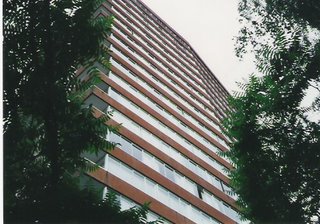Depends on how you want to live.
If every one's lifestyle was similar to that of the Inuit people in northern Canada, the world would definitely be too crowded. Living on the seal hunt, fishing and nomadic lifestyles takes lots of open space. Plenty of elbow room.
If the Canadian north were as densely populated as, say, the state of California, it wouldn't work. There wouldn't be enough fish and wildlife to go around. People would starve.
Some lifestyles, like those of the Inuit people, take up lots of space.
Folks might say the Inuits are "space hogs" even though they don't do that much harm to the environment.
This brings up an interesting point.
Someone can need a lot of space without necessarily harming the environment.
Many of the traditional living patterns on this planet haven't had that big of an impact on nature, but at the same time they need huge amounts of space to survive.
On the other hand, the stereotypical American "drive to the mall" lifestyle does have a big impact on the environment. It has an impact, but the typical American may need less space to survive than the typical Inuit.
Imagine that. Less space.
Yes, it does take some space to drive to the supermarket, find a parking place and pick out the fish from a fish counter, but if the fish is raised in a fish farm it might take a lot less space than if it were raised in some wild stream.
Imagine that. Less space needed for the typical American?
That's counter intuitive.
One hears that if the entire world were to live like Americans, we would need 7 planets the size of Earth. Yes, it is true. Our industrial society does have a big impact on nature. Land used for oil production, parking, subdivisions, agriculture, garbage, timber, mining, whatever.
Still, thanks to technological advances such as high intensity agriculture, we can cram more people into smaller land areas and still survive.
My guess is, traditional cultures like the Inuit of the Canadian North, need a lot more space than we do, even though their impact on the environment is less. They just need the elbow room, so the world is too crowded for them.
How many Earths would we need if we all lived like Inuits; all 6 billion of us on this planet?
That's a good question.
For just about all of the world's history, there were less than one billion people on this planet. When most of the world's people lived as some natives do today, there were very few people.
Then along came agriculture.
How many people can survive off one acre?
That's another "geographical" question.
It depends on the way people are living. Technology and high yield agra-industry can produce more food, per acre, and allow more folks to live on the planet. Things like high rise apartment towers can hold many folks while minimizing impact on the environment.

High rise residential tower and greenery in the well planned West End section of Vancouver, BC. One of the more densely populated parts of the world, but the West End holds its people quite comfortably.
"Car free West End living" could fit more people onto the planet than "sprawling auto centered American lifestyles," or, for that matter, "nomadic centered native lifestyles."
How many people can survive per acre?
It also depends on what type of acre you are talking about. Arctic tundra, or Iowa farm country? Cold ice, or fertile farmlands.
One has to hand it to the Inuit people for being able to survive thousands of years in arctic conditions. It's not like they are living in an area with hundreds of bushels per acre. It would take real talent to survive in the arctic.
So, land use and over population are interesting subjects.
People often debate whether the world is too crowded, or not.
Just remember one thing.
Some people need huge amounts of land, "elbow room," even if they don't have the technology to exploit that land the way modern Americans do.
The world may already be too crowded for these people.

No comments:
Post a Comment